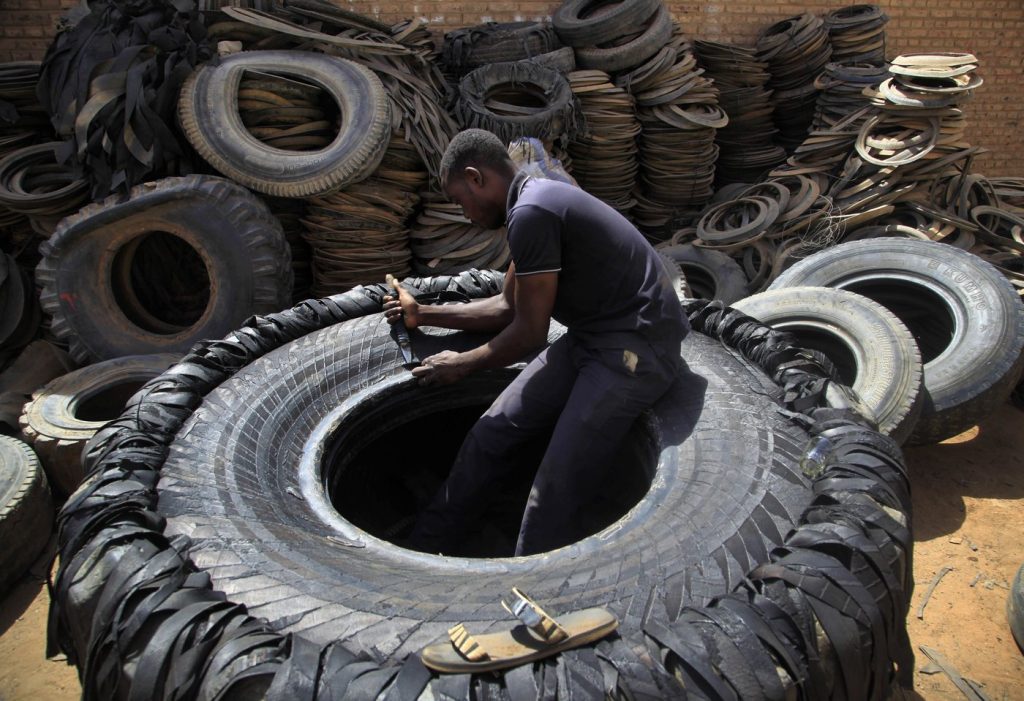WAU, South Sudan (AP) The innovative practice of transforming discarded tires into footwear is a notable aspect of local ingenuity, not only in South Sudan but across regions like Rwanda and Kenya as well. In South Sudan, however, this craft has gained a new dimension as it is now driven by an escalating economic crisis that has nearly brought the government to bankruptcy, leaving many residents grappling with food insecurity.
The decline in oil revenues has put tremendous strain on the South Sudanese economy. As a result, the government has faced challenges in consistently paying civil servants, affecting a wide spectrum of workers from soldiers to teachers. In the face of this financial crisis, many citizens are actively seeking alternatives to make ends meet.
In the quest for affordable footwear, residents are turning to local artisans instead of supermarkets, finding flip-flops and sandals made from worn-out tires that are typically discarded as waste. The demand for such handmade shoes is rising in response to increasing living costs, underscoring their importance in the local economy.
Located approximately 650 kilometers (400 miles) from the capital city of Juba, Emmanuel Achuil operates as a shoemaker under a tarpaulin in Wau’s bustling main market. Covered in rubber stains, he skillfully carves materials from old tires using a blade, with vibrant straps scattered around his workspace. Achuil, who produces five to ten pairs of shoes weekly, remarks on the evident increase in demand directly correlated to the rise in living expenses. His experience is echoed by various vendors displaying similar shoes in open markets across South Sudan, including in Juba.
Two years back, Achuil had about five to seven customers monthly; he now anticipates welcoming up to 20 clients each month. His shoes are priced at approximately 15,000 South Sudanese pounds, or roughly $4, depending on size and finishing quality. Alongside their low price, these handmade shoes are commended for their durability.
Notably, Akol Majok Ring, a cattle-keeper from Warrap, shared how he purchased sandals in March, appreciating their suitability for cattle grazing. He stated, "When you’re moving with the cattle all day, these sandals are perfect. They’re durable and well-suited for the job."
As the South Sudanese pound endured considerable depreciation in 2023, driven by sporadic disruptions in oil exports due to civil strife in neighboring Sudan, the economy has further declined over five consecutive years. The ongoing violence is primarily attributed to the political power struggle between President Salva Kiir and his deputy, Riek Machar, who is presently under house arrest on allegations of subversion.
The stark realities of hyperinflation and extensive food insecurity now impact nearly 80% of South Sudan's population of 11 million, aligning with the World Bank's estimates indicating the same number living below the poverty line.
The South Sudanese government relies heavily on oil revenues, accounting for approximately 90% of its annual budget. This year, damage to oil pipelines in Sudan momentarily halted the country’s crude oil exports. Despite announcing a resumption of exports following repairs, many government employees remain unpaid and unemployment prevails as basic goods' prices skyrocket. In this context, leather shoes are often regarded as luxuries.
Regular customer Deng Akol Athuai, who has been purchasing from Achuil for years, noted, "Tire soles last longer. I buy one pair, and it lasts me a year or more. They’re strong, especially for walking on rough roads."
Gabriel Bataku, a 26-year-old unemployed young man in Wau, highlighted the artisans' contribution, stating they are "solving real problems" and emphasized their need for recognition and support. Achuil, who has been crafting shoes since 1996, learned his trade informally by observing experienced shoemakers during his childhood. He reflects on the increased competition for discarded tires as many have entered the trade.
Despite challenges, he expresses a desire for formal support to access better tools, with an aspiration to establish a workshop that would allow him to train others. Achuil hopes to extend his business to additional towns in South Sudan saying, "If I had better cutting tools, and a way to expand, I could train young people. Many are idle here in Wau. This skill could help them survive."










